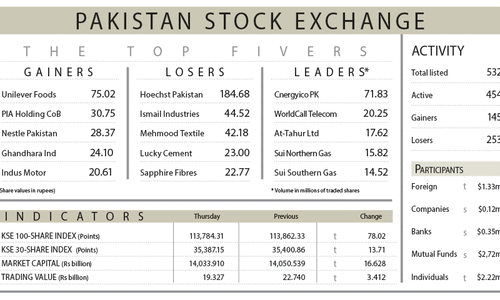KARACHI, April 14: Foreign made fountain pens, ball points, pencils and a variety of other stationery items have flooded the market threatening the local industry.
Bulk of these items originates from China. There are also stationery items coming from Indonesia, Iran, Germany and Malaysia. Local stationery industry operators contend that all these foreign writing instruments and stationery items now command 42 per cent of the local market, rendering their production capacities idle.
Quite a big quantity of foreign fountain pens, ball points, pencils, drawing pins, staplers, glues and adhesives, markers, writing ink and many other stationery items are simply smuggled across the border or brought here in the baggage by the incoming passengers from abroad. However, the local producers are actually worried over a sizable quantity passes through customs check-posts and at the ports where these goods are misdeclared and under-invoiced in connivance with the customs staff.
A break-up of items reveal that 30 to 40 per cent of under-invoiced imported and smuggled pencils are being sold in the markets, while in fountain pen — imported and smuggled items now virtually rule the market.
The installed capacity of pencils of four units in the organized sector is three million gross pencils per year and 1.5-2.0 million is being utilized, while one million gross is being imported every year.
People are crazy to buy Chinese pencils, which are being sold at Rs2 per pencil as compared to locally produced pencils at Rs3. A packet containing imported pencils, rubber, sharpener, ball point etc., can also be purchased at Rs10 at roadside stalls.
Industry people say that an estimated 25-30 containers of pencils have been imported into the country in 2002-03 valued at $12,150 per container having a total value of $303,750. Besides, three to four containers are entering the country per month.
In fountain pen, the installed capacity is 12 million pieces per annum, while only one unit is producing around six million pens a year and two leading units Eagle Pen and Blackbird had already packed up their business few years back. An estimated 25 million fountain pens are finding way into the market every year through imports and illegal channels. Locally produced pens are priced at Rs10-15 per piece, while Chinese pen price ranges between Rs10-20. A retailer says that he sells only one or two locally made pens a day as compared to 8-10 Chinese pens.
However, Pakistani producers enjoy comfortable position in markets as they produce 30 million pieces per year out of total installed capacity of 48-50 million. Around 15-20 million pieces are coming through imports and smuggling. Prices of imported and local brands are almost identical.
In ball points, local production stands at 140 million ball points per annum as compared to 40-50 million pieces of imported and smuggled items. Around five units are producing ball points in Pakistan.
Chairman Writing Instruments Manufacturers Group of Pakistan (WIMGOP), Riazuddin said that the total market size of imported, local and smuggled items is estimated at Rs3 to Rs3.5 billion in which the share of imported and smuggled items is Rs1.5-1.75 billion and the unorganized sector enjoys market size of Rs0.5-0.75 billion.
He said the entry of imported items specially from China has opened up a tough price competition in the market and people are switching over to imported items despite of low quality as compared to locally produced items.
The local markets are now flooded with majority of Chinese brands of pencils, ball points, markers, pencils, fountain pens and other stationary items. Retailers are selling Chinese ball points at Rs5 with four colour refills and some are charging Rs10 for four ball points set.
Riazuddin informed the Collector of Customs Appraisement few days back that wooden pencils, crayons, pencil leads, ball points, fountain pens, tipped pens, markers, paper clips, staples, drawing pins, staples in strips, glues and adhesives, writing inks, fine liners and fibre tips are being cleared at various ports through under-invoicing and misdeclaration.
The unscrupulous elements of the trade have got a free hand following the abolishment of ITP regime and the adoption of the WTO Valuation Code thus indulging in all sorts of clandestine imports thus depriving the exchequer millions of rupees in duties and taxes.
Ex-chairman of WIMGOP Ahsanullah Khan said the practice of under-invoicing was prevalent in the ITP era also but at a very nominal pace. After the rescheduling of ITP on pencils, the fraudulent under-invoice imports were checked and subsequently for the next two years, the import dropped significantly providing much relief to the local manufacturers.
He said after discontinuation of the ITP regime, under-invoicing and misdeclaration gained momentum. He added a quality pencil under the commodity code No.1040 ($2.50 per gross) and 1050 ($2.62 per gross) is being imported after being declared as ordinary pencil at $0.90 per gross. Wooden pencils consist of raw materials like imported wood, lead (imported material in-house manufactured), lacquer (imported material in-house manufactured), PVA glue (local) and packing material (local). With these broad based raw materials, the cost of wood alone if imported from China of various assortments amounts to $1.46 per gross pencils and with the addition of other raw materials the price in no case can be $0.90 per gross.
WIMGOP chief Riazuddin last week urged Finance Minister Shaukat Aziz to exempt all stationary items from sales tax along with books and computers and exempt the raw materials and components that goes into the production of stationary items from the whole of customs duty.
He said Pakistan also exports $5.5 million of writing instruments and stationary items all over the world and the exports are rising gradually.












































